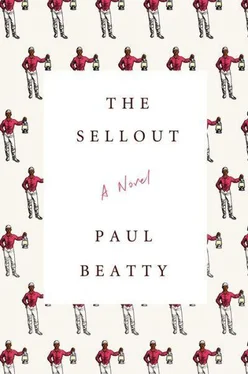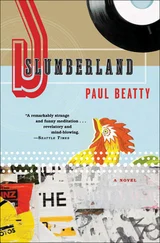When the lights went up, the host announced that the last living Little Rascal was in the house and invited Hominy onstage. After a standing ovation, he wiped his eyes and took a few questions. When talking about Alfalfa and the gang, Hominy’s incredibly lucid. He explained the shooting schedule. How the tutoring worked. Who got along with whom. Who was the funniest off camera. The meanest. He lamented how no one ever notices Buckwheat’s emotional range and rhapsodized about how much his mentor’s speech and diction improved in the MGM days. I kept my fingers crossed that no one would ask about Darla, so I wouldn’t have to hear about a take-five reverse cowgirl under the bleachers in “Football Romeo.”
“We have time for one more question.”
From the back, directly across the aisle from me, a group of blackfaced coeds stood in unison. Dressed in Victorian bloomers with the Greek letters Ν Ι Γ stitched across their chests, and their hair haphazardly set in thick plaits with wooden clothespins, the women of Nu Iota Gamma looked like dolls you’d see at an antiques auction. In unison they tried to ask a question.
“We wanted to know…”
But they were beaten back by a chorus of boos and a hail of paper cups and popcorn containers. Hominy hushed the audience. The room grew silent, and as it turned its self-righteous attention back to him, I noticed the woman closest to me was African-American, the tininess of her ears giving her ethnicity away. It was a rare sighting on Sunday afternoon, a true female coon, black as seventies funk, black as a C+ in organic chemistry, black as me.
“What’s the problem?” Hominy asked the crowd.
A tall, bearded white boy in a fedora a couple of rows in front of me stood up and pointed a finger at the line of sorority Topsies. “They are in non-ironic blackface,” he said defiantly. “That’s not cool.”
Hominy shielded his eyes with his hand and peered blindly into the audience and asked, “Blackface? What’s blackface?”
At first the audience laughed. But when Hominy didn’t crack a smile, the guy stared back at him with a doltish wide-eyed look of bewilderment not seen since the days of great buffoons like Stepin Fetchit and George W. Bush, the first coon president.
The white dude respectfully called Hominy’s attention to some of the films we’d just seen. “Sambonctious,” where Spanky pours ink on his face and pretends to be Hominy so his dusky friend can pass the spelling test and join the gang on the school trip to the amusement park. “Black Rascallion,” where Alfalfa dinges up so that he can audition to be the lead banjo picker in an all-Negro jug band. “Jigga-Boo!” where Froggy turns the tables on a ghost by stripping down to his skivvies and covering himself from head to toe in fireplace soot, shouting “Boo-ga! Boo-ga! Booooo!” Hominy nodded his head, laced his thumbs in his suspenders, and rocked back on his heels. Then proceeded to light and smoke an invisible cigar, which he switched from one side of his mouth to the other. “Oh, we didn’t call it blackface. We called it acting.”
He had the audience eating out of his hand again. They thought he was being funny, but he was dead serious. For Hominy blackface isn’t racism. It’s just common sense. Black skin looks better. Looks healthier. Looks prettier. Looks powerful. It’s why bodybuilders and international Latin dance contestants blacken themselves up. Why Berliners, New Yorkers, and businessmen, Nazis, cops, scuba divers, Panthers, bad guys, and Kabuki stagehands wear black. Because if imitation is indeed the highest form of flattery, then white minstrelsy is a compliment, it’s a reluctant acknowledgment that unless you happen to really be black, being “black” is the closest a person can get to true freedom. Just ask Al Jolson or the slew of Asian comedians who earn their livings by acting “black.” Just ask those sorority girls, who were settling back into their seats, leaving the lone black member to fend for herself.
“Mr. Hominy, is it true? Does Foy Cheshire really own the rights to the really racist Little Rascals movies?”
Damn, don’t get this nigger started about that Foy Cheshire bullshit.
I stared at the black-faced woman in blackface, wondering if she, too, was acting, if she felt free. If she was aware that the natural color of her skin was actually blacker than her “blackface.” Meaning technically she was in somewhat-lighter-than-blackface. Hominy pointed me out in the crowd, and when he introduced me as his “master,” a few heads turned around to see what a real live slave owner looked like. I was tempted to tell them that Hominy meant to say “manager” and not “master,” but I realized that in Hollywood the two words amounted to the same thing. “I believe it to be true. And I believe my master’s going to get them back for me, so that one day the world will see my best and most demeaning and emasculating work.” Thankfully, the houselights began to dim. The racist cartoons were starting.
I like Betty Boop. She has a nice body, is free-spirited, loves jazz, and apparently opium, too, because in a hallucinogenic short titled “Ups and Downs,” the moon is auctioning off a Depression-era Earth to the other planets. Saturn, an old, bespectacled Jewish orb complete with bad teeth and a heavy Yiddish accent, wins and rubs his hands greedily. “I gottum. I gottum da whole vorld. Mein Gott ,” he gloats, before removing gravity from the Earth’s core. It’s 1932 and Max Fleischer’s metaphorical Jew is making an already chaotic global situation even worse. Not that Betty cares, because in a world where cats and cows fly, and the rain falls up, priority number one is to keep your skirt line from ascending to the heavens and exposing your form-fitting panties. And who’s to say that Ms. Boop isn’t a member of the tribe? For the next sixty minutes a few drunken, droopy-feathered Native Americans fail to catch the Warner Bros. rabbit, much less assimilate. A Mexican mouse tries to outwit the gringo pussycat, so he can sneak across the border and steal the queso. A seemingly endless lineup of African-American cats, crows, bullfrogs, maids, crap shooters, cotton pickers, and cannibals act a gravelly-voiced Looney Tunes fool to the strains of “Swanee River” and Duke Ellington’s “Jungle Nights in Harlem.” Sometimes a shotgun blast or dynamite explosion turns a nominally white character like Porky Pig into a gunpowder-colored minstrel. Bestowing upon him honorary-nigger status, which allows him to sing merry melodies like “Camptown Races” over the closing credits with impunity. The program ends with Popeye and Bugs Bunny taking turns single-handedly winning World War II by flummoxing bucktoothed, four-eyed, gibberish-speaking Japanese soldiers with giant mallets and geisha subterfuge. Finally, after Superman, supported by gongs and a cheering audience, pulverizes the Imperial Navy into complete submission, the lights come back on. After two hours of sitting in the dark laughing at unmitigated racism, in the brightness the guilt sets in. Everyone can see your face, and you feel like your mother caught you masturbating.
Three rows in front of me a black guy, a white guy, and an Asian guy prepared to leave, gathering their jackets and trying to shake off the hatred. The black kid, embarrassed at having been debased and ridiculed in cartoon classics like “Coal Black and de Sebben Dwarves,” and still hiding behind Superman’s cape, playfully attacks his Asian homeboy. Shouting, “Get Patrick! He’s the enemy!” as Patrick raises his hands in self-defense, protesting, “I’m not the enemy. I’m Chinese,” Bugs Bunny’s Jap, monkey, slant-eyes slurs still ringing in his ears. The white kid, unscathed and unfazed from the skirmish, laughs and flips a cigarette into his mouth. Smoke ’em, if you got ’em. It’s crazy how quickly an evening of Little Rascals shorts and Technicolor cartoons, some nearly a century old, can raise the ire of racial antipathy and shame. I couldn’t imagine anything being more racist than the “entertainment” I’d just witnessed, that’s why I knew the rumors about Foy owning a portion of the Our Gang catalogue had to be false. What could be more racist than what we’d just witnessed?
Читать дальше












